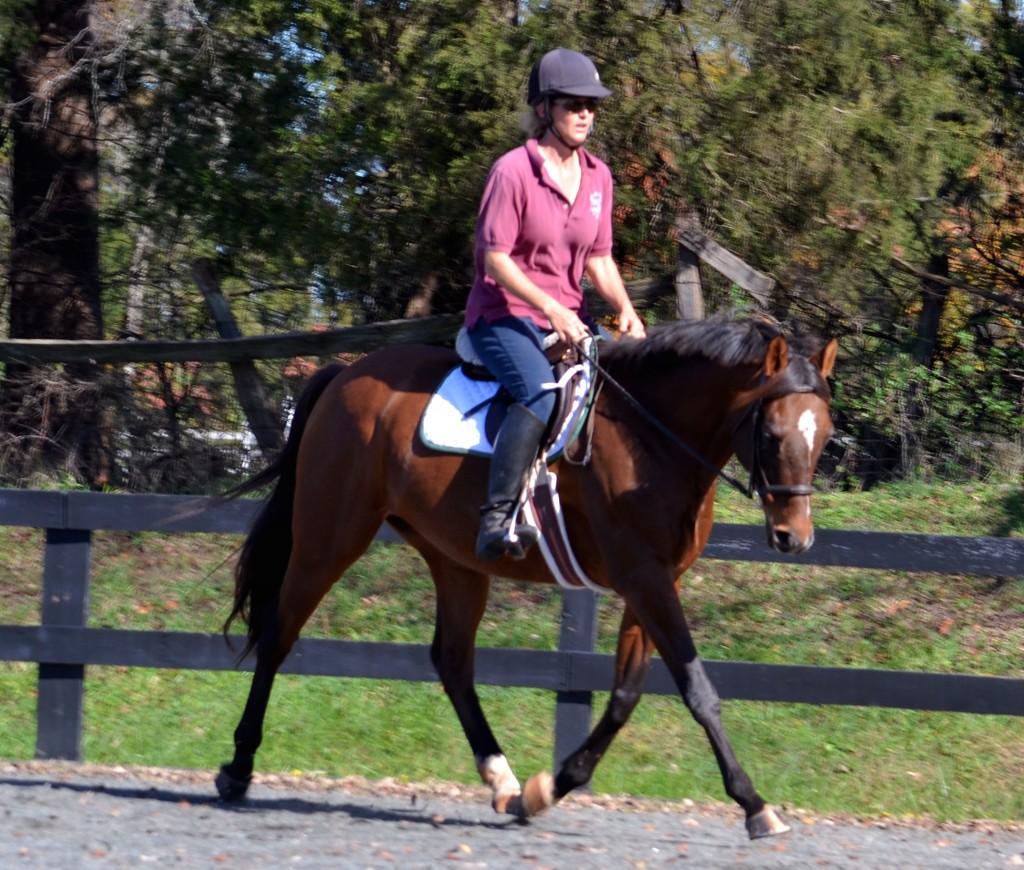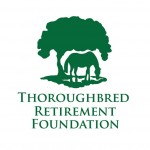
Kim Wilkins, farm manager of the TRF Montpelier Farm, says horses are in her DNA.
When Kim Wilkins stops to ponder the twists and turns she took before winding up re-training OTTBs on James Madison’s sprawling Virginia estate, she chuckles and admits the seed was planted early.
“My first word wasn’t Mommy or Daddy, it was horsey,” says Wilkins, the farm manager for the Thoroughbred Retirement Foundation’s (TRF) Montpelier Farm. “My mother fox hunted, and her idea of good babysitting was to put me on a pony at age 3, put me on a long line, and take me out hunting.”
Brave from the get-go, Wilkins went on to do a stint with the Army as an intelligence analyst before rounding out her formal education later in life with a degree from PACE University; studying art, economics and French.
But no matter how her professional path meandered, horses were her center of gravity.
While in the Army, she found ways to take riding lessons during her off hours, and in college she paid her way while working as a groom at show barns. Until she eventually landed at the TRF’s Montpelier Farm in Virginia.
In this week’s Clubhouse Q&A, Wilkins discusses some of her more memorable moments, from re-training two feral horses rescued from dire circumstances, to overseeing a herd of 47 horses now living out their retirement years on a piece of the famous 2,500 acre farm once belonging to James and Dolley Madison.
Q: You once accepted the challenge of training three wild horses. Please tell me about that.

Point of Glory, 13, (Dark Passage x World Appeal) is a 15.1 hand gelding who is available for adoption.
We had three horses rescued in the Ernie Paragallo case. (Please see the N.Y. Daily News article here). Over the years, I’d handled a lot of green horses. But most of them had been at least handled. These guys were completely feral. They didn’t have names, or tattoos, and nobody knew who they were. So I named them Red, Brown and Tank (for their physical attributes).
I started with the very basics. You could get halters on Brown and Red, and they were reasonably cooperative about being brushed, but Tank was a different story.
And I just started them like you’d start a baby.
Q: How did you use patience and repetition to tame them?
I went very slowly with them. I’d say, ‘Hello horse, this is a saddle. It will be a saddle today, it will be a saddle tomorrow, and it will be a saddle years from now. It won’t hurt you.’ I worked with a volunteer who came out four days a week, and we worked with them to establish a routine.
They came in every day and ate breakfast, got brushed, and then we worked to put the tack on. We did that for several days until they figured out that the bridle didn’t hurt. Then we moved onto the saddle pad and the saddle. When we put the saddle on, we’d pull the girth around, but didn’t cinch it. And then finally we got to the point where we could cinch it, and they went on the lung line to learn voice commands. I teach them all “whoa” straight up, and things like walk, trot and canter.
About a year later, they were going on trail rides and now Red’s a polo pony and Brown was adopted and is doing shows and trail rides. Tank just didn’t have the brains for it, and he’s still in my field.
Q: One of your favorite OTTBs was Arrested Gatorgirl, who was rescued from the slaughter pipeline.

Arrested Gatorgirl and her Madisyn DeCant share a laugh in the dressage ring. Photo by Sharon DeCant
She was a little horse, only about 15.1, and she was cute, cute, cute. I tried and tried to sell her, but everyone kept saying she was too short. She was such an amazing horse I decided to keep her for myself. I cold do anything with her. I took her out in the woods, pointed her in any direction, and she’d do anything.
Then one day Madisyn came along looking for a horse. She tried a couple of others (please see earlier story) but wanted a horse a little more trained. So I said I thought I had someone she might like. She hopped on Gator, and Gator did her job, and they loaded her up and took her on home. She was just such an easy horse, and so balanced and so much fun. I’m glad she wound up with people who appreciate her.
Q: How did you wind up in this line of work?
I grew up in Carlisle, Mass and New Hampshire. I went to prep school at Chatham Hall in Virginia and realized how much nicer the climate was, so I stayed. You can ride all year long here! After school, I worked as an Intel analyst for the Army, writing reports on the Mideast. And I took the 10-year plan to finish college. I started off studying biology thinking I wanted to be a vet. Then I went to work for a vet and changed my mind. I switched to art and eventually graduated with a degree in French and economics.
I worked at a lot of farms during that time, working mostly as a groom, and I managed a few smaller stables.
That work led me to work for the executive director of the Virginia Horse Center, Robert Reel, until his death. And after he died, I reached out to L. Clay Camp, who was on the board of the horse center and the TRF. This was in 2003. I’m so grateful that he gave me a chance!
When your first word is horsey, the horses are obviously in your DNA.


You could say something like
the American thoroughbred is always over looked on the national show level -and truthfully they are one of the most intelligent and athletic breeds that there is
. their stamina, willingness to perform and pure heart is second to none.
It would be nice, just like other breeds have, if someone were to organize a specific type of class for the American off-track thoroughbred that could be taken to the national level. Mr. Emerson is to be commended on his vision for this off-track thoroughbred’s potential.
I think we should look at him as someone who is setting the pace on something that will reach many people who own the thoroughbreds. I think people should follow his lead created division on the national level to give the off track thoroughbred a chance to show people exactly what they’re capable of. I know people would be amazed and astounded
great story! We went to the same prep school and share the same love of horses.
Can I find out when Kim went to Chatham?
Great story! Always great to hear of the good people out there who are doing so much good for our Thoroughbreds!